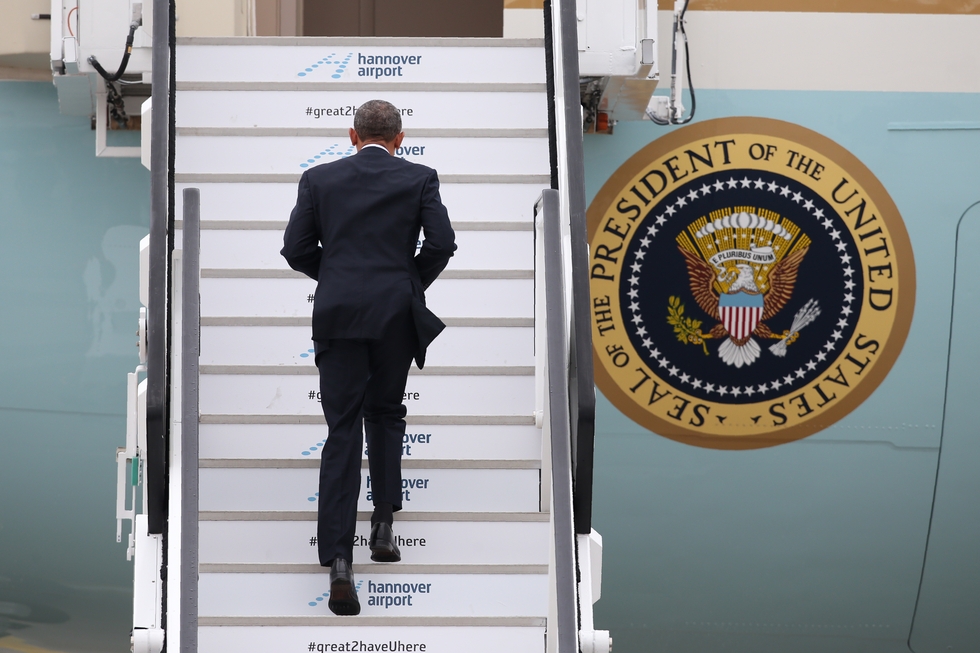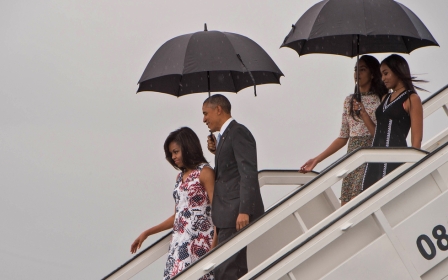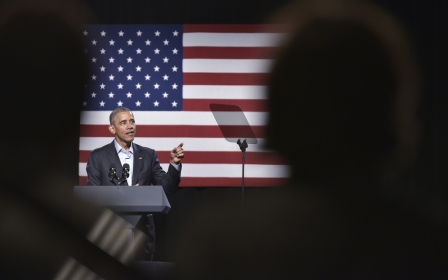US diplomats look to a different Syria policy post-Obama

As we approach the end of the Obama administration and prepare for a Trump or Clinton presidency, the debate over his legacy is ratcheting up. Last week saw what some described as an "unprecedented" internal State Department memo of over 50 US diplomats critical of the president’s Syria policy.
The diplomats argued that the current policy out of Washington had become “overwhelmed” by the death and destruction on the ground and pushed for a “judicious use of stand-off and air weapons, which would undergird and drive a more focused and hard-nosed US-led diplomatic process.”
It is often said that a new president’s approach is defined by the legacy of their predecessor.
Obama inherited a legacy of failed intervention in the Middle East from George W Bush. Iraq was a messy and unpopular war that Obama argued against. While he doubled down on Afghanistan – seen as the "good" war – Obama allowed an increasingly belligerent Iraqi prime minister Nouri al-Maliki to usher US troops out of the country in 2011. Campaigning the next year ahead of his re-election as president, Obama reminded supporters that he was good to his word: “I said I'd end the war in Iraq. I ended it.”
Being the president who ended, rather than started, wars in the region was to be Obama’s preferred legacy but that line was challenged by the unprecedented events of the Arab Spring. The chaos and uncertainty that followed would force Obama’s hand in the case of Libya where US intervention helped unseat Muammar Gaddafi in 2011. Yet with some similarity to Iraq, toppling an authoritarian dictator was one thing, winning the post-dictator peace is another and Libya descended into chaos and civil war following the end of the Gaddafi regime.
Despite the fact that Obama "led from behind" in Libya, a conflict that France in particular spearheaded, it was still seen in his own words as his “worst mistake” after “failing to plan for the day after what I think was the right thing to do in intervening in Libya”.
A desire to withdraw from the region’s conflicts and guilt about Libya, the conflict he was most associated with, was the backdrop to understanding Obama’s policy towards Syria. Add to this the initial turn of events in Syria which suggested that Assad would go the way of Mubarak with little to no US involvement needed. This didn’t happen and instead Syria’s war grew increasingly brutal. This brutality would set the stage for Obama’s second Syria moment. If the first was a decision not to intervene at the outset, the second was the president describing Assad’s potential use of chemical weapons as “a red line” that would have “enormous consequences” and “change my calculus” on military intervention.
The red line was crossed and nothing happened, instead over five years on more than 400,000 people have been killed in fighting and over 11 million have fled the country or are internally displaced according to UN figures. Frederic Hof, formerly Obama's special adviser for transition in Syria, wrote recently that "for Russian President Vladimir Putin, Syria is all about beating the United States".
Obama would seem to agree that such were US strategic priorities that he’d accept Russian ownership of the conflict. In a wide ranging April interview with the Atlantic, that some suggest was designed to help shape his foreign policy legacy, Obama explained that such was the Russian and Iranian investment in Syria that “the notion that we could have - in a clean way that didn’t commit US military forces - changed the equation on the ground there was never true.”
Yet the equation of the conflict has changed rapidly over the past few years. Syria hasn’t simply imploded, instead the chaos and the carnage have exploded with global ramifications with the emergence of the Islamic State (IS) whose rise suddenly threatened not only Washington’s allies in Baghdad but Americans across the globe. Suddenly Obama was putting boots back on the ground in Iraq and Special Forces into Syria as he sought to stem the flow.
IS has become the prism through which Obama’s Syria policy was now seen with the future of Assad deferred to the multilateral diplomacy of the various Geneva processes we’ve had to date. Yet this process, despite setting out ambitious objectives concerning transition for the country and having a brief window of success in de-escalating violence, has largely failed, with US Secretary of State John Kerry saying in the middle of June that "Russia needs to understand that our patience is not infinite. In fact it is very limited with whether or not al-Assad is going to be held accountable."
Whilst Kerry’s patience is running out, many US diplomats have clearly already lost it entirely, hence their letter. Rami G Khouri, senior policy fellow of the Issam Fares Institute for Public Policy and International Affairs, described the letter to Obama as a verdict on his Syria policy of “fully fledged incoherence at the level of global statecraft”. In early May, Kerry said that the Syrian conflict is "in many ways out of control". It is this deadly combination of chaos and incoherence that the next President will need to address in order to revitalise US policy towards both Syria and the wider region.
The terrorist threat from IS, the unprecedented migration crisis and the regional humanitarian crisis are all holistically linked to a lack of vision as to what a Syria of tomorrow can or should look like and what is the US role in making that happen. The new president will have to be willing to seriously and strategically grapple with these issues rather hoping that they will go away on their own or be dealt with by somebody else. Obama’s Syria legacy is not something of which he can be proud; instead it will be an urgent and incredibly difficult priority for his successor.
- James Denselow is a writer on Middle East politics and security issues and a research associate at the Foreign Policy Centre in London.
The views expressed in this article belong to the author and do not necessarily reflect the editorial policy of Middle East Eye.
Photo: US President Barack Obama boards Air Force One on the tarmac at the airport Langenhagen near Hanover, central Germany, on 25 April, 2016 (AFP).
Middle East Eye propose une couverture et une analyse indépendantes et incomparables du Moyen-Orient, de l’Afrique du Nord et d’autres régions du monde. Pour en savoir plus sur la reprise de ce contenu et les frais qui s’appliquent, veuillez remplir ce formulaire [en anglais]. Pour en savoir plus sur MEE, cliquez ici [en anglais].





